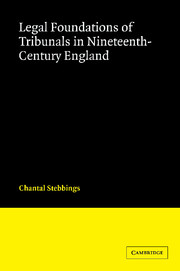Book contents
- Frontmatter
- Contents
- Acknowledgements
- Table of statutes
- Table of cases
- List of abbreviations
- 1 Challenges to the legal process
- 2 The ideological and theoretical context
- 3 Composition and personnel
- 4 Jurisdiction and functional powers
- 5 Procedure and practice
- 6 Judicial supervision
- 7 Principles, place and perception
- Index
1 - Challenges to the legal process
Published online by Cambridge University Press: 02 December 2009
- Frontmatter
- Contents
- Acknowledgements
- Table of statutes
- Table of cases
- List of abbreviations
- 1 Challenges to the legal process
- 2 The ideological and theoretical context
- 3 Composition and personnel
- 4 Jurisdiction and functional powers
- 5 Procedure and practice
- 6 Judicial supervision
- 7 Principles, place and perception
- Index
Summary
Statutory tribunals today surpass the courts of law in terms of numbers of disputes heard and resolved. They are recognised as adjudicative bodies of central importance to the efficient operation of the regular courts themselves and the administration of justice in general. It has been shown that an individual citizen's personal contact with a formal adjudication process is far more likely to be in the context of an administrative tribunal than of a court of law. Tribunals operate in a wide range of aspects of everyday life, hearing and determining appeals by individuals aggrieved by an administrative decision taken by an organ of the state. Their principal feature is that they do so in an effective, accessible, expeditious and inexpensive way. They are today of a known constitution, applying clear rules to the dispute before them and arriving at a determination. Within this broad characterisation, however, there exist a very large number of tribunals, varying considerably in their functions, jurisdictions, procedures and personnel. A tribunal's objective might be to adjudicate, investigate, regulate, advise or award, or perform a combination of two or more of these functions.
Though modern tribunals retain some degree of executive provenance, they are often almost entirely adjudicatory in function. They establish facts and apply legal rules, albeit within a very specific jurisdiction, but are bodies existing outside the formal structures of the courts of law. Their place is, accordingly, ambiguous.
- Type
- Chapter
- Information
- Publisher: Cambridge University PressPrint publication year: 2007



